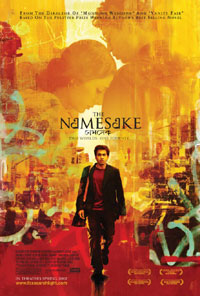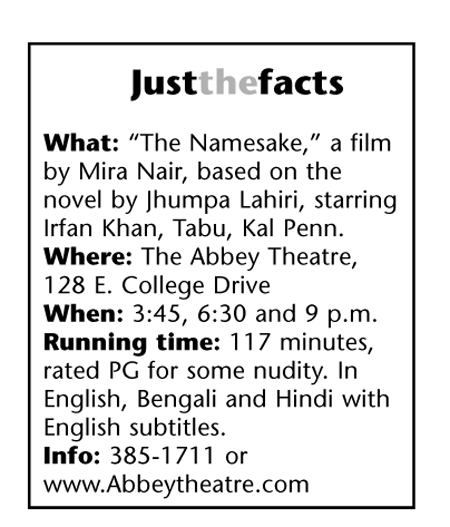| ||||
Threads of a well-worn coat by Judith Reynolds Like the red thread of life, rituals of coming together and saying goodbye constantly weave in and out of “The Namesake.” Director Mira Nair’s film of the immigrant experience is full of weddings, births, naming ceremonies, departures and the ultimate goodbye, a funeral. In between stretches the messy web of life: major decisions, minor disappointments, disasters, profound loneliness, wrong turns and the occasional clear path. Nair (“Monsoon Wedding,” “Mississippi Masala” and “Hysterical Blindness”) concentrates on the interweaving of family relationships. Like her other movies, Nair probes the leap taken by the first generation of immigrants, the perils of assimilation faced the second, and how a layered family makes or doesn’t make it through tumultuous change. Based on Jhumpa Lahiri’s best-selling novel of the same name, the film clings closely to the multigenerational story. Publicity leads one to believe the movie is all about Gogol Ganguli (Kal Penn), the American born son of Bengali immigrants. But it’s far more than that. “The Namesake” has the Dickensian sweep of a multi-plot narrative filled with a central family surrounded by a village full of minor characters. The film roughly spans 25 years, which includes all of Gogol’s life from birth through his Yale graduation and a budding architectural career. It also ranges over the remarkable marriage of Ashoke Ganguli (Irfan Kahn) and his wife, Ashima (Tabu). With such a long arc, a generation in itself, the narrative challenges are immense. Episodic in structure, the story of an arranged marriage and its offspring, the film illuminates two cultures and two principal cities – Calcutta and Boston. Contrasts are constantly drawn, and the whole fabric is stitched together by using flashbacks as short, visual cues – the red threads that carries the weight of meaning and memory. Yet, if any criticism might be made of this deeply moving film, it is perhaps too dense, too concentrated. Packed with the conflicting themes of chance and inevitability, misunderstanding and tender communication, “Namesake” moves swiftly through big chunks of time like a flying shuttlecock on a loom. One minute a 4-year-old boy decides to keep his odd name, the next, years later, he regrets the decision. One serious break is followed by a back-breaking disappointment. A short prologue introduces the hot, steaming world of Calcutta where the Ganguli family saga begins. Without preparation, we are plunged into a moving crowd at a train station. A man in front carries an old rattan suitcase labeled “A Ganguli.” Then a quick cut to a crowded compartment shows us a young man lost in his reading, oblivious to the chaos around him. He’s reading one of the most famous short stories in world literature, Nikolai Gogol’s The Overcoat. Ashoke Ganguli is drawn into a conversation with an older man about reading, travel, family and life. Then, unexpectedly, there is a horrendous collision.
A short prologue introduces the hot, steaming world of Calcutta where the Ganguli family saga begins. Without preparation, we are plunged into a moving crowd at a train station. A man in front carries an old rattan suitcase labeled “A Ganguli.” Then a quick cut to a crowded compartment shows us a young man lost in his reading, oblivious to the chaos around him. He’s reading one of the most famous short stories in world literature, Nikolai Gogol’s The Overcoat. Ashoke Ganguli is drawn into a conversation with an older man about reading, travel, family and life. Then, unexpectedly, there is a horrendous collision. A blackout, followed by elegant titles, signals the beginning of the movie. Only much later are the prologue’s narrative bits integrated into the larger story. In a touching father-son scene full of disconnects, Ashoke reveals why he gave his son such an odd name. That scene has further reverberations that will break your heart. Much is made of names and naming throughout the film, especially the problems faced by immigrant children in school. But “The Namesake” is about so much more than that. The father-son relationship is particularly poignant; the mother-son relationship has its own valleys. Gogol’s quest for his true self seems to be the central thread, but again, it’s embedded in a larger tapestry. Apparently both Irfan Khan and Tabu are leading actors in India, and they are magnificent. They create a convincing picture of strangers meeting, marrying and somehow creating a successful partnership. When Ashima begins her new life in America, it is a cold tale of loneliness, broken only by her husband’s comings and goings in his academic life. Gradually they build a future with children, friends and a new sense of community. Gogol undergoes the most dramatic changes as he wrestles with what it means to be a Bengali-American. That he vacillates among several names is but a superficial clue to the struggle he’s undergoing at a deeper level. His often rude behavior will be familiar to every parent in the audience. His careless disregard at crucial moments is heartbreaking, partly because we know what he will go through when he comes to terms with his youthful missteps. Nitin Sawhney’s musical score ranges over a wide landscape, from rap to Indian ragas. It’s often jarring, but so are life’s unexpected interruptions. Frederick Elmes’ cinematography brims with brief abstract visions, which are repeated to tighten the tapestry throughout. Allyson Johnson’s editing is a miracle of its own. In such a complex tale, the vision of the director and the light touch of the editor are crucial. This is a film not to miss. •
|



